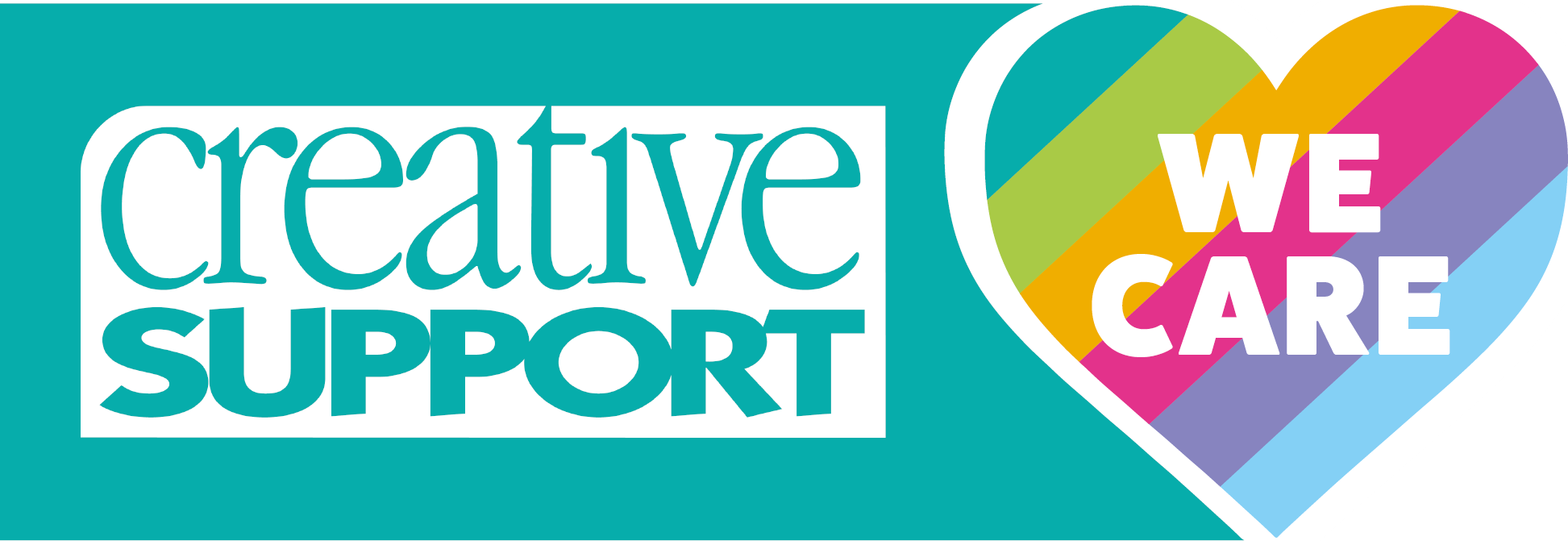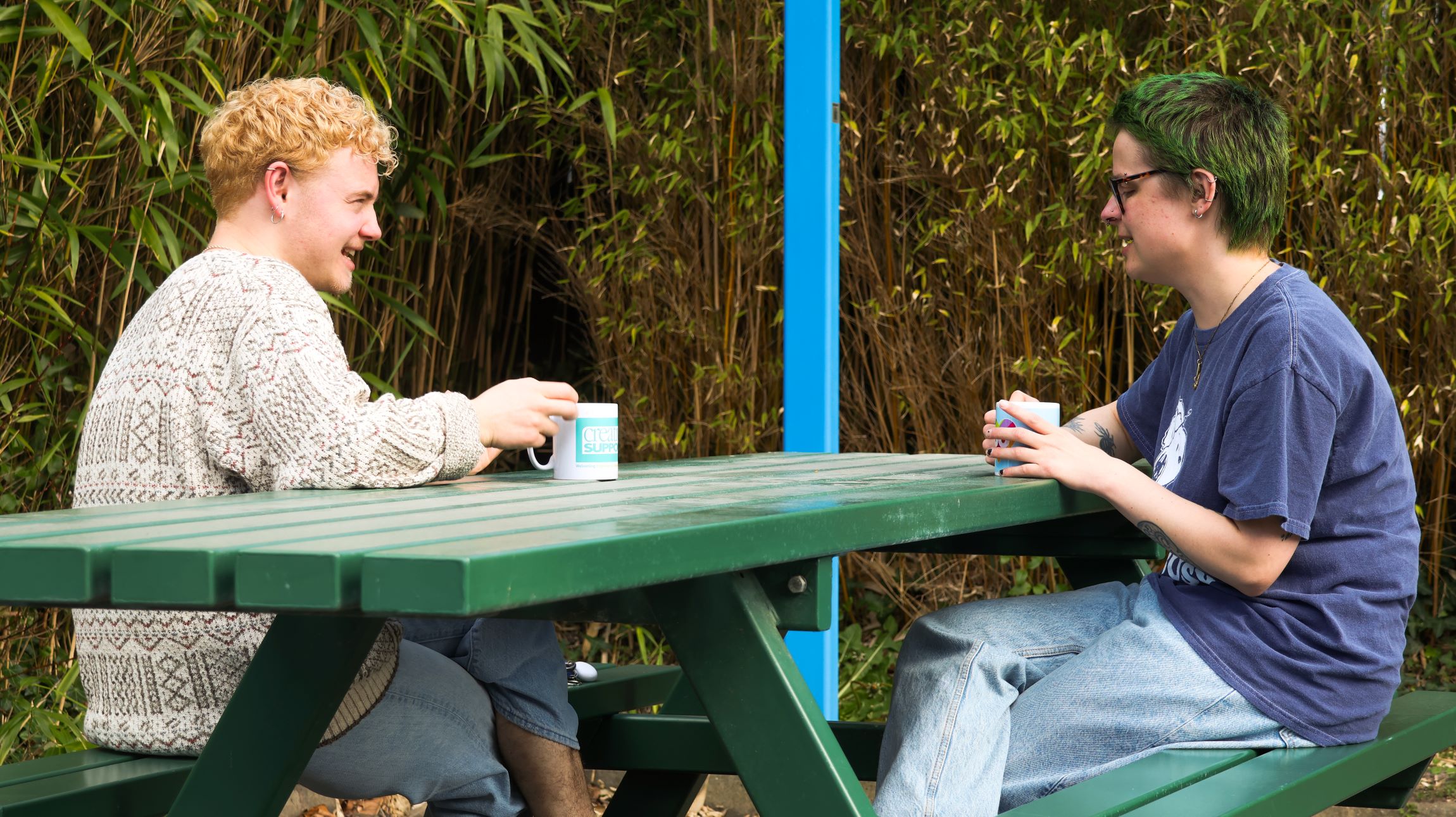A Conversation about Trans Healthcare
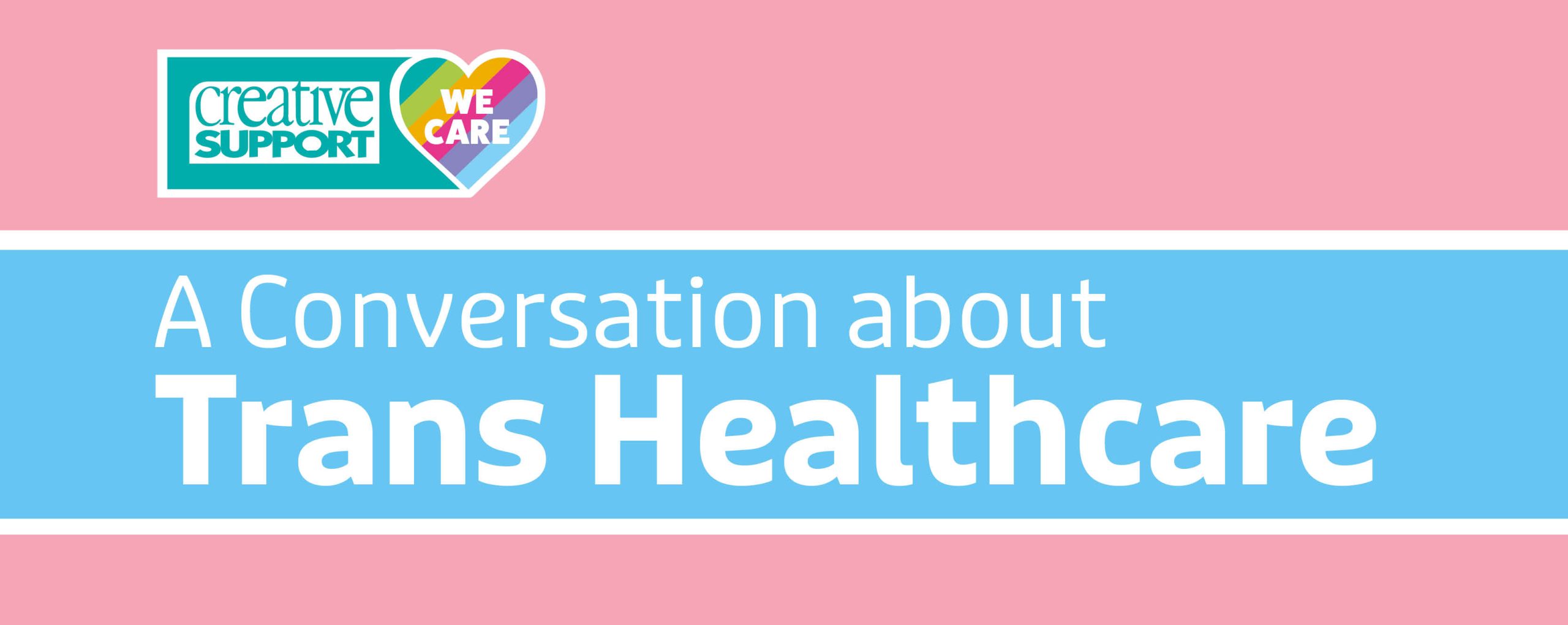
For International Transgender Day of Visibility, Payroll Administrator, Abs, and Communications Officer, Grae, speak about the healthcare challenges trans-masculine people face in the UK as well as offer their own experience.
We hope through reading this conversation, you learn more about how the healthcare system works for trans people and why being an ally is so important. You can find a glossary of terms that may be new to you at the bottom.
We’re also launching our leaflet, ‘What Does it Mean to be Trans?’ to help staff and people we support navigate coming out as trans. Click here to find out more.
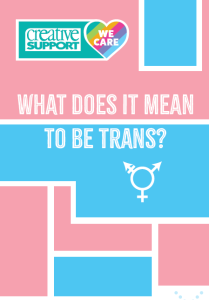
Our leaflet is all about what to do if you’re coming out as trans, and how to support others coming out. It answers some of the most common questions about the trans community including how to use pronouns correctly and how to become a better ally. There is also a list of organisations you can reach out to if you need extra support with healthcare, finding community and other aspects of gender transition.
Read on to hear Grae and Abs in conversation.
Content warning: please note that this article deals with upsetting topics relating to mental health.
Grae: Hey Abs, where shall we start? What do you think about the current state of trans healthcare in the UK?
Abs: Hey Grae, I think the current system is overstretched. Trans people can either get the healthcare they need through the NHS which takes years, or pay an extortionate amount privately. I’ve been in the NHS system since 2021 and only in 2023 was I able to access gender-affirming healthcare. There’s just not the resources for the amount of people that need it.
Grae: There’s also increasing numbers of trans people looking to access healthcare. So, if you’ve been on the waiting list since 2021, is that the waiting list before you’re seen by a gender clinic?
Abs: So, I went to my GP in 2021 who referred me to the gender clinic in Manchester, Indigo, and I was on the waiting list until 2023. I started on testosterone in August 2023, so it’s clear just getting into the system is difficult.
Grae: So the main issue is getting into a gender clinic. Once you’re in there, things move a bit more quickly, but not a lot more.
Abs: For hormones, it does move more quickly once you’re admitted to the clinic, yeah, but I’m also on a waiting list for top surgery two years later and I’ve had to go out of area for it because Manchester stopped taking referrals.
Grae: And how much further have you had to go?
Abs: There aren’t many surgeons in the UK and the only one that was a reasonable distance was in Hull. I’ll be getting top surgery this year.
Grae: Congratulations! But I know the waiting time is extremely painful for many trans people, and that’s when people start to experience really dark thoughts. The statistics are all there. Sometimes you’re able to get bridging hormones. Do you want to talk about what they are?
Abs: I wasn’t actually aware of bridging hormones when I first went to my GP in 2021. No one told me about it. Bridging hormones are a prescription you can get while you wait to be admitted to a gender clinic. They can be life-saving. A lot of trans people will seek out that information via social media or word of mouth, but that wasn’t something I was made aware of by my GP, which is shocking because I know now some GPs will do bridging prescriptions. You have to go to the right GP to do it. It turns out my GP does it, but they didn’t tell me, even when I said I was really struggling.
Grae: I know I’m at the same GP as you, and I only managed to get bridging hormones because I heard from a friend that it was possible at this particular GP practice and I asked for it. The legal requirement is that if a trans person says they are in a very bad place with their mental health or at risk of self-medicating, they can obtain bridging hormones. Most trans people are in a bad place navigating the complicated and biased healthcare system, so it is devastating when a GP doesn’t offer bridging hormones. I had to say, ‘I know you do bridging hormones and I’ve been told that you prescribe that. Will you do that for me if I am severely depressed?’ And they said, ‘Oh okay, we’ll look into it.’ I don’t think most of the GPs were really even aware themselves that it was an option that might save lives, and those who refuse to prescribe are either gatekeeping or worried about losing their jobs amid transphobic headlines and healthcare cultures.
Abs: These barriers are why a lot of trans people end up going through DIY hormone replacement therapy or go private.
Grae: So, who do you think are most excluded from the trans healthcare system?
Abs: People on lower incomes, because they don’t have the option. You see so many people having to do a GoFundMe just to get life-saving healthcare. People with non-supportive families are also particularly excluded as well because if your family isn’t supporting you, and there’s no healthcare professional you can trust, that can feel really lonely.
Grae: Exactly, and trans people of colour and neurodivergent trans people.
Abs: For sure, I’ve heard a lot of healthcare professionals not taking autistic people seriously. I have a friend who is diagnosed ADHD and autistic, and is non binary, and they were really nervous about putting an autism diagnosis on their record, because they were worried that if they eventually went for trans healthcare, they’d not be taken seriously. I was so sad that they felt they had to hide that bit of themselves to access healthcare.
Grae: Yeah, to get a diagnosis of gender dysphoria I worried about disclosing past struggles with mental health. They were asking me whether my mental health issues might have led to me looking for answers such as transness. They even asked me what childhood toys I played with to make sure they were ‘masculine’ enough which is just ridiculous. I think maybe they’re under pressure because what trans people do with their bodies is controversial. There’s a huge lack of trust. It felt as if I was in an interview and trying to prove myself, and at the time I felt so scared and alone and ashamed, especially not having community around me to tell me it was going to be okay.
Abs: I was also really worried about disclosing depression and anxiety to my doctor because I was like, are they just going to put my dysphoria down to my anxiety and my depression? I am pleased to say, they were actually really good and they sort of turned it around like, ‘do you think the dysphoria was contributing to that?’ Talking to my GP wasn’t great, but everyone I’ve met at the gender clinics been really good.
Grae: Sometimes it takes a few brave and empathetic healthcare professionals willing to do the research to make you feel seen. How much do you know about the experience of trans people in healthcare systems in other countries?
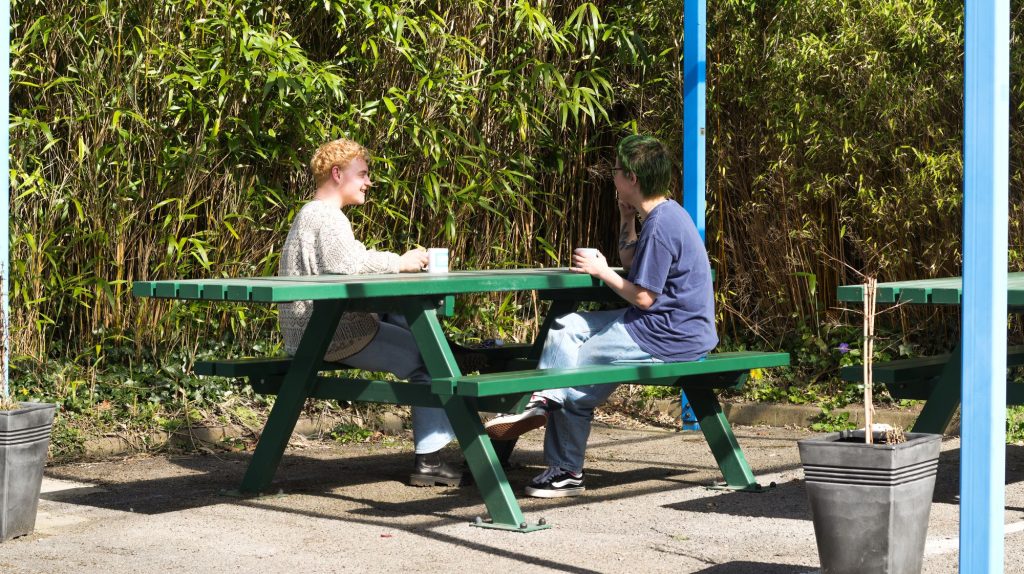
Abs: I think in some European countries, it is better. I know a lot of trans people from the UK go abroad to get surgery because there’s not as much of a barrier and it can be cheaper. For example, Poland and Spain and Turkey, but you shouldn’t have to go abroad to do that.
Grae: Yeah, the thought of going somewhere abroad for top surgery then having to pay for a hotel for two or three weeks while you can’t raise your arms or lift anything sounds really hard. Many employers wouldn’t give sick pay for that, and you need someone else to take all that time off work to look after you as well. What do you think healthcare professionals can do to be better allies?
Abs: I think they just need to be better educated, because I don’t think many GPs have even met many trans people. I had to explain everything to my GP at each stage, how to get hormones and surgery. I think lots of GPs get very nervous about trans stuff and don’t understand it. I think they need better communication too. I’ve had my GP not reminding me I need a blood test, even though it’s in my notes from my gender clinic saying I need them every three months. They had to send me to the walk-in centre on a Saturday at half past eight in the morning to get it done in time for my follow up appointment.
Grae: That’s happened to me so many times! They always forget to remind me, then it delays the whole process and I’m out of hormones for a couple of weeks and that causes terrible mood swings. Sometimes I’ve just had a text basically saying ‘sorry the entire country has run out of testosterone’ and I’ve had to go without for weeks. I feel like any minute the rug can be pulled from under me as a trans person in the UK.
Abs: Yeah we really are managing our care by ourselves. I feel like my doctor just signs off my prescriptions and doesn’t look at anything properly.
Grae: Education and communication are two really good points, and they come down to the government being willing to invest in trans healthcare. Have you heard their stance on puberty blockers for trans kids?
Abs: It’s horrible. I didn’t come out as trans until I was in my 20s, but I know that there are kids who are coming out in their teenage years and not getting the treatment they need because the government have denied hormone blockers to under 18s.
Grae: When that news was announced last year, it was a really awful day. I also didn’t know I was trans until I was in my 20s and in some ways I’m grateful because I didn’t know there was anything I was being denied.
Abs: I can’t imagine coming out as a child and having to navigate a system that seems so hostile towards trans people, especially if you don’t have adults around who can explain it to you and support you. My parents are accepting, but don’t entirely get it and aren’t going to get involved.
Grae: It’s all about trust. I think we can trust young people when they say, ‘I want to make these life changing decisions because I can’t be happy any other way.’ I think many adults think kids are seeing TikToks about being trans, and suddenly deciding to marginalise themselves, but coming out as trans is such a huge process. Kids don’t want to be going to loads of meetings and taking time out of school and bringing potentially unsupportive parents into it. It is not a decision they’re taking lightly. Puberty blockers aren’t even life-changing, they’re reversible.
Abs: People seem to think that kids are just walking into gender clinics and being given hormones like sweets or something and I’m like, that’s not what’s happening, because it’s an excruciating process to go through even as an adult where there are less restrictions.
Grae: On a completely different topic, there are much more clear paths for trans men and trans women since we live in such a binary world, but as a non-binary person, how difficult is the system for you, and what are the specific challenges?
Abs: The gender clinic have been good with giving me choices. I’m on a low dose of testosterone which is what many non-binary people who wish to look more masculine opt for, so I get the changes more slowly. Other non-binary people just want top surgery and not hormones, and can opt for that.
Grae: It’s personal for everyone.
Abs: Yeah there’s not one specific goal, especially with many non-binary people. There’s more nuance.
Grae: Yeah a lot of trans men I know, including myself, are very clear about what kind of changes they want, often the most masculine option. Then there are some trans men who don’t want all changes and obviously an even bigger proportion of non-binary people who don’t want all of the changes. Some trans people want surgeries, some do not. There’s this assumption that trans people immediately want surgeries and hormones, so they can look like a cis person, but that’s not true. I guess that brings me on to talking about how beautiful it is to be trans, because there are just so many different presentations.
Abs: There is no one right way. I got told that constantly during the process by people I met through the gender clinic. I was really nervous, especially because being non binary is not specifically recognised as a legal gender in the UK, so everyone told me this is my path, and I choose what I want. I’m learning to embrace everything I wasn’t sure about, because it feels more like me now.
Grae: Community is so important.
Abs: I learned more about navigating the healthcare system from trans people than I did from the system. I’ve got a friend who’s currently wanting to start the process. They’re like, ‘Abs, tell me everything.’ It’s also important that you don’t have to go through trans healthcare to be trans as well. I think some people, especially non binary people, don’t always get taken seriously because they don’t want hormones or surgery. You can be trans and only change your haircut.
Grae: Yeah, and in this community, there is so much hope and fire in our hearts. It’s amazing how we rally together at an anti-transphobia protest or be everything we ever wanted to be at Trans Pride.
Abs: At Trans Pride, there’s also support with healthcare too which gives me hope. I think the LGBT Foundation who go to Trans Pride help people with deed polls and advice about navigating the system.
Grae: Yeah, there are so many people clearly trying to make a difference. I see on Instagram people doing PhDs on trans health, asking if trans people want to participate in a survey which is just so wonderful. Some of those people will be cis allies as well.
Abs: Yeah, a lot of my cis friends from school are so supportive. They always want to know how I’m doing. One of them came to my first gender clinic appointment with me because I was so nervous. She came and sat with me and took notes. I’m really glad I have allies around me. Even work feels like a safe space to be because people are either allies or queer. The staff LGBTQ+ Network is really good and the changes that we’ve made to the policies are really impactful.
Grae: Yeah we get special leave for appointments now. It’s just invaluable.
Abs: If I need to go to a gender appointment, I don’t have to worry about losing an entire day of pay or annual leave to meet my basic healthcare needs.
Grae: We’re going to be okay. Thanks for talking to me Abs and sharing your story.
Abs: Thank you! And happy Trans Day of Visibility.
Glossary of Terms
Trans-masculine – an umbrella term often shortened to “transmasc” that describes individuals assigned female at birth (AFAB) whose gender identity or expression is masculine. This encompasses trans men, non-binary people, and other identities.
Gender clinic – a healthcare centre also known as a “gender identity clinic” or “gender dysphoria clinic” that offers assessments, psychological support, and medical interventions for trans and non-binary people experiencing gender dysphoria.
Top surgery – a surgical procedure that alters the shape and appearance of the chest to create a more masculine or feminine look for trans and non-binary individuals.
Bridging hormones – a temporary prescription of hormone replacement therapy (HRT) issued by a GP to a patient waiting for specialist treatment at a Gender Identity Clinic (GIC), acting as a harm reduction strategy.
Gatekeeping – refusing to treat trans people or delaying gender-affirming care without a clear health-based reason. It often centres on a perceived need for “mental readiness” or “stability” before medical transition, which can be subjective and discriminatory.
DIY hormone replacement therapy (HRT) – trans and non-binary people obtaining and using hormones for gender affirmation without a prescription or medical supervision.
Gender dysphoria – the severe distress someone feels when their gender identity differs from the sex they were assigned at birth.
Puberty blockers – medications used to delay or stop the physical changes of puberty, primarily in trans and non-binary young people.
Deed poll – a legal document that an individual can use to officially change their name.
